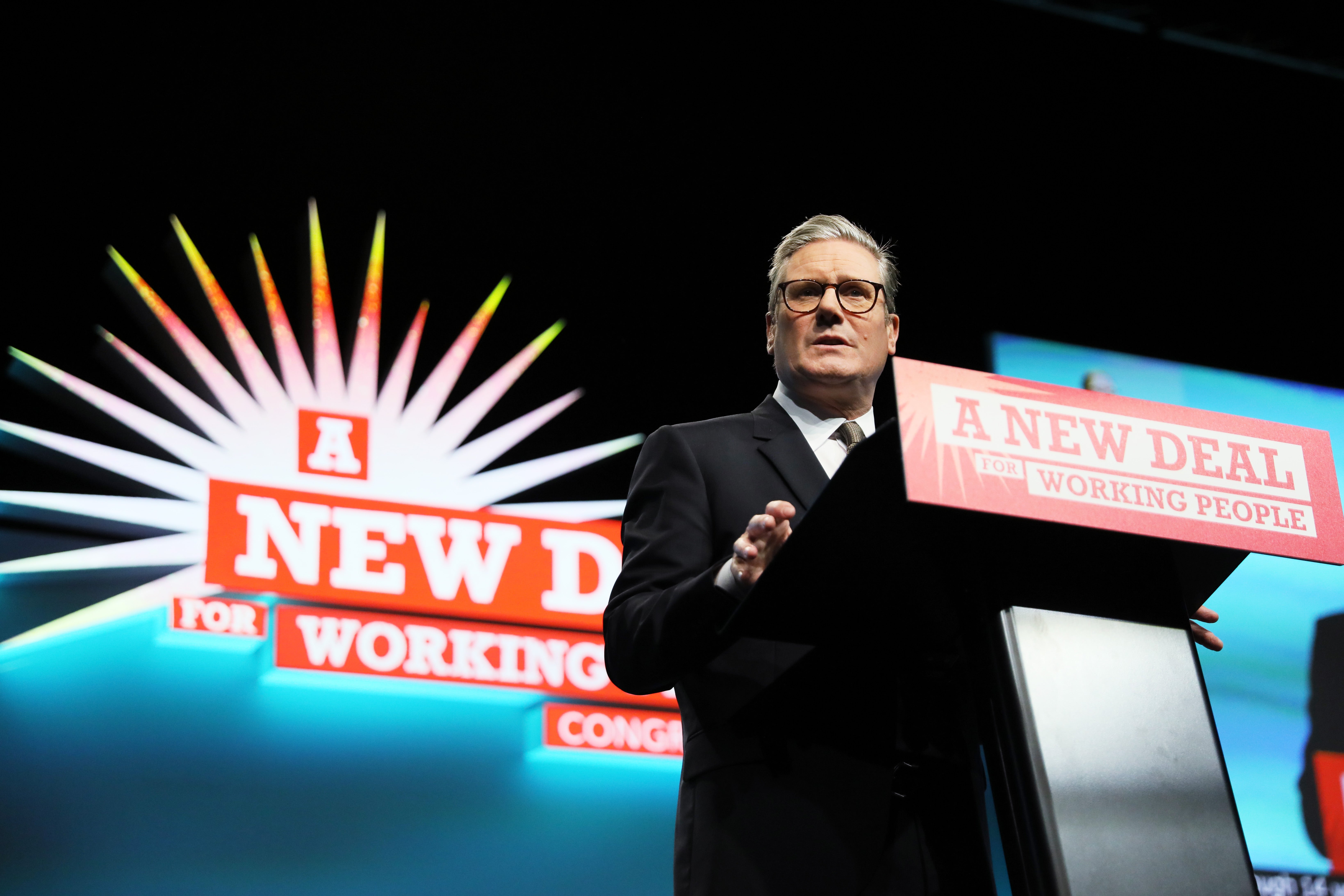Can Starmer woo the unions back into a fulfilling relationship with Labour?
The prime minister’s appearance at the TUC was met with politeness rather than enthusiasm – but perhaps that’s the best he could expect. Sean O’Grady looks at how the political and industrial arms of the Labour movement might make a go of it this time round


As the first Labour leader to address the Trades Union Congress as prime minister in 15 years, Keir Starmer might have hoped for a more enthusiastic reception. Then again, as a Labour premier who has got his “betrayal of socialism” in early, the polite applause he received was perhaps about the best that could be expected.
What used habitually to be referred to, sentimentally, as “this great movement of ours”, or “TIGMOO”, is still holding together, because the political and industrial arms of the Labour movement still need each other more than either would care to admit. This is what Starmer calls the “politics of partnership”.
But there are undeniable tensions...
What did the trade unionists expect?
As with Tony Blair when he was building “New Labour” and taking the party into government in the 1990s, they knew, from bitter, disappointed experience, not to expect that much from “their” prime minister. For example, to help his campaign to become Labour leader in 1994, Blair promised to retain the old Clause IV, pledging to nationalise the commanding heights of British industry, only to renege on that shortly after.
So, too, with the various promises made by Starmer in 2020, which were designed to appeal to trade unionists and the left when he was running for leader. Many of them have since been jettisoned.
When Blair won the 1997 election, he told the Labour movement that they had “won as New Labour and would govern as New Labour”; now Starmer tells them: “We ran as a changed Labour Party and we will govern as a changed Labour Party.” So they know from recent experience what type of leader Starmer is.
What did they get?
Gloom. Starmer apologised for it, but didn’t deviate from the government’s line on the public finances, child benefit, the pensioners’ winter fuel allowance, or anything else for that matter. Sadly for the heckler who cried “Tax the rich,” the Budget that will do that hasn’t yet been published.
On industrial relations and workers’ rights, the brothers and sisters of the trade union movement were not given as much as they’d hoped for – but at least it’s a Labour government, so, for now, they’ll be spared another round of Conservative trade union regulations. Starmer promised to repeal some of the minor reforms passed in recent years, removing the “minimum service level” obligations for strikers (which proved too difficult to implement in practice anyway) and the higher thresholds for ballots on industrial action.
Angela Rayner and Jonathan Reynolds will be placing new workers’ rights into legislation soon, but the “new deal for workers” won’t be as strong as originally envisaged a few years ago – so no sectoral collective bargaining, for example. But employees might win more flexible working hours and the right not to be bothered by their bosses at home.
Aren’t they pleased with their pay rise?
Some, though of course not all, are affiliated to the TUC (ie the RMT train staff and the junior doctors). It’s true that wages are now rising faster than inflation, but that’s just economics, so it can’t reasonably be attributed to the new government – and some taxes that affect working people, such as fuel duty and council tax, are likely to be going up soon.
The outlook for pay awards is also looking more difficult. The upshot is that there is no necessary reason why trade unionists will refrain from taking action just because there is a Labour government – and both the 1964 and 1974 Labour governments were marked and damaged by sometimes lethal conflict between Labour ministers and the unions. It would not be that surprising if Wes Streeting or Bridget Phillipson were to encounter considerable industrial unrest in the NHS and schools in the coming years – quite possibly worse than that faced by their Tory predecessors.
So will Starmer cave in to his union paymasters?
It’s true that the incoming government has been granting above-inflation rises to some groups (albeit not always ones that donate to Labour), but it is acting as it should, and according to convention, in following the advice of the independent pay review bodies – set up 40 years ago precisely to avoid strikes in vital public services.
Besides, as Starmer and Rachel Reeves will never tire of saying, “There is no money.” They calculate that the unions, with some exceptions, will continue to find the party a more palatable alternative to a Conservative one.






Join our commenting forum
Join thought-provoking conversations, follow other Independent readers and see their replies
Comments